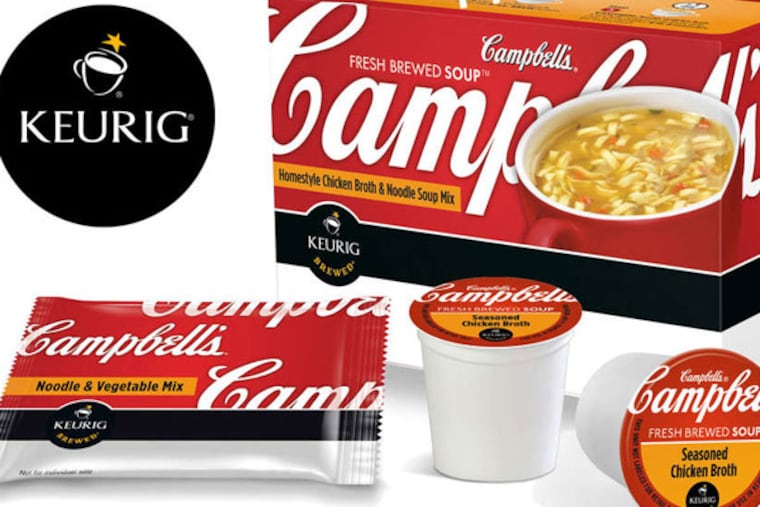What's brewing? A K-Cup of Campbell's soup
About a year ago, Campbell Soup Co.'s chief executive, Denise Morrison, was using a Keurig machine to make herself a cup of coffee and had a thought:

About a year ago, Campbell Soup Co.'s chief executive, Denise Morrison, was using a Keurig machine to make herself a cup of coffee and had a thought:
"Wouldn't it be great if we could get soup at the touch of a button?" Morrison recalled in an interview Wednesday.
As head of the world's biggest soupmaker, she was in a position to do more than just wish. Morrison took the idea to people she knows at Green Mountain Coffee Roasters Inc., which owns Keurig.
The result? Next year, Campbell and Green Mountain plan to start selling what they call Campbell's "fresh-brewed soup" in a K-Cup.
"I've observed the penetration of the K-Cups in the coffee business. It's been really, really popular with consumers in the home and out of home," Morrison said.
She sees the K-Cup as a way to fulfill her company's goal of "finding an opportunity to create an afternoon snack that is ultraconvenient and flavorful."
Plus, the product could help Campbell toward the long-term goal of boosting soup sales in a format other than the traditional metal can.
The plan is to offer three flavors of soup to start, but only one has been identified: Homestyle chicken broth and noodle. A small packet contains dried noodles and vegetables, which will go into a cup first. The K-Cup contains the powdered broth, which will be made by the Keurig machine and poured over the noodles and vegetables.
The price for a box of Campbell Soup K-Cups has not been set, Morrison said.
"We are still working through all of the mechanics," she said.
The cups will be produced in plants owned by Green Mountain, which is based in Waterbury, Vt., with ingredients made according to Campbell recipes, a Campbell spokeswoman said.
It is not clear who will manufacture the soup mix. The company no longer sells dried soup in the United States.
Financial details were also not available.
A potential benefit to Campbell is that selling soup in K-Cups could get the Camden company into stores such as Staples and Bed Bath and Beyond, where it does not sell soup now, Morrison said.
Green Mountain has seen explosive growth, with revenue reaching $3.9 billion in fiscal 2012, up from $786 million in fiscal 2009.
The company estimated last month that there were 16 million Keurig machines in use in the United States - compared with 118 million U.S. households.
Harry Balzer, chief industry analyst and vice president of NPD Group, a consumer-research firm in Port Washington, N.Y., agreed that soup in K-Cups was noteworthy.
Consumers like to try new things. But they have to be new things they are familiar with, and soup fits the bill, Balzer said.
"They are not going to have to go too far to find people who are willing to try this," he said.
The challenge for Campbell and other makers of consumer packaged goods is taking it another step.
"If the only thing it provides is novelty, then it's gone from the marketplace," Balzer said. "But if it serves a value, like time or money, then it finds a way into our diets."